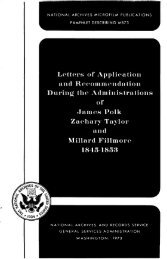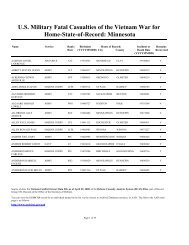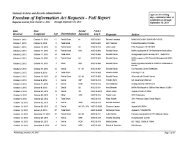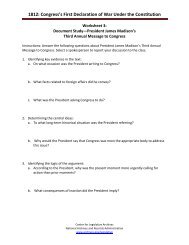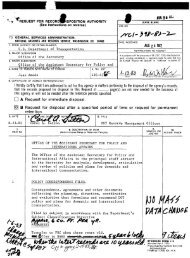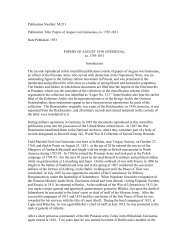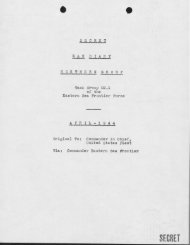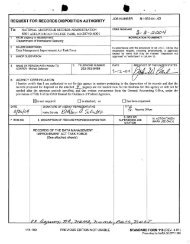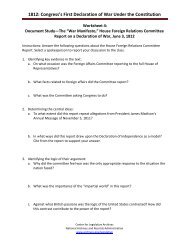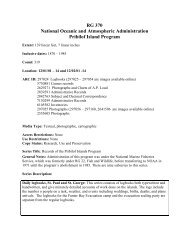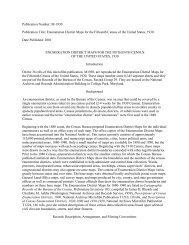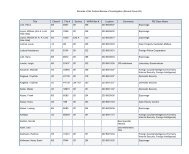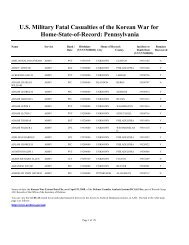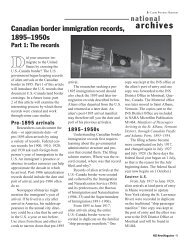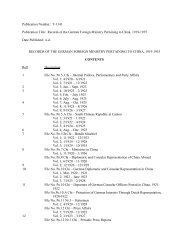HITLER'S SHADOW - National Archives and Records Administration
HITLER'S SHADOW - National Archives and Records Administration
HITLER'S SHADOW - National Archives and Records Administration
Create successful ePaper yourself
Turn your PDF publications into a flip-book with our unique Google optimized e-Paper software.
Agent Erhard Dabringhaus, who h<strong>and</strong>led Barbie as of June 1948 <strong>and</strong> had a<br />
reputation for lax security. Fischer became familiar with general CIC practices in<br />
the Augsburg <strong>and</strong> Munich regions <strong>and</strong> with the identities of numerous older <strong>and</strong><br />
newer sources used by more than one CIC Regional office. Because of Fischer’s<br />
extensive knowledge of CIC sources <strong>and</strong> methods, Ida worried that “dropping<br />
[Fischer] at this time may do more harm than good.”<br />
Instead, Ida began to shift Fischer’s activities away from Project Happiness<br />
to “projects of less sensitivity <strong>and</strong> importance,” such as the “investigation of the<br />
activities of former Gestapo, SS <strong>and</strong> NSDAP officials.” Region XII also tried to<br />
learn Fischer’s own sub-sources as well as what Fischer knew of CIC sources <strong>and</strong><br />
methods. This task was difficult owing to Fischer’s “extreme reluctance to submit<br />
sufficient information regarding his sub-sources…. Overly precipitous action in<br />
this respect will make [Fischer] aware that he is being ‘debriefed.’” 51<br />
Mahler’s case was similar to Fischer’s. Released from U.S. detention in<br />
September 1948, Mahler faced denazification in Augsburg almost immediately. 52<br />
He intended to protect himself in the proceeding by naming Max Lappler, a local<br />
KPD functionary, as a wartime Gestapo informant. Lappler was now working as an<br />
informant for Fischer. To protect Mahler <strong>and</strong> his source within the KPD, Fischer<br />
wrote the U.S. authorities in hopes of postponing Mahler’s denazification hearing,<br />
adding that, “the KPD had a definite political interest in eliminating former Gestapo<br />
officials who were specialists in Communist questions, through the Spruchkammer<br />
[Denazification Courts].” 53 Mahler’s hearing labeled him an “Activist” (i.e., not a<br />
“Major Offender”). Still, he immediately appealed the finding with the argument<br />
that the hearing was politically inspired by the local KPD. The Spruchkammer<br />
decision was nullified on September 24, 1949, though the circumstances are<br />
unclear. 54 Mahler’s restraint in mentioning old Gestapo sources made him suitable<br />
for intelligence work. 55 His resumé, submitted to the CIC, mentioned his work<br />
against Communists in the Gestapo <strong>and</strong> omitted his service in Einsatzgruppe B.<br />
CIC Region XII used Mahler as an informant beginning in February 1949.<br />
By May, he was a full-time employee at Region XII, performing secretarial duties<br />
<strong>and</strong> holding daily discussions with Special Agent Herbert Bechtold about the<br />
KPD <strong>and</strong> its methods. At the same time, Mahler worked for Fischer. He received<br />
300 marks per month plus cigarettes, coffee, soap, <strong>and</strong> razor blades. It was an<br />
improvement over his first postwar job as a construction laborer. 56<br />
New Materials on Former Gestapo Officers | 45



